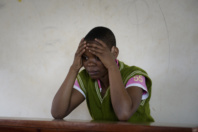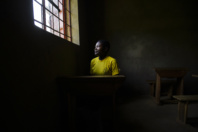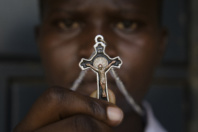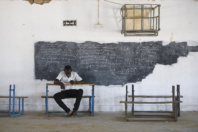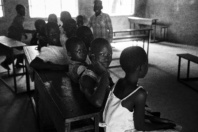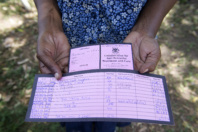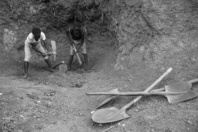Kampala, Uganda.
Violence against women.
Namirembe Hadijah 18 years old.
“I stay all week at school. I sometimes go home on weekends. When I arrived here, I was the youngest in the class. I immediately realized that everything would not be easy. Boys at school do not consider us as equals. Often they refuse to participate in compulsory work such as housework etc. Some boys ask us to wash their belongings because they consider that it is the role of women. There are also cases of sexual assault in our school. One time I saw a friend in my class crying and she explained to me how she had been touched by a boy in her class.”
Kampala, Uganda.
Violence against women.
Juliette 16 years old.
“ It expected school to be safer than at home but I quickly realized that I was mistaken. I often have to refuse the advances of older boys who think that they can take advantage of me as I am woman. If I refuse to do their school household chores I risk being beaten by some of them. I dream of being a politician and promoting womens’ rights in Uganda but I realise that this may be difficult to achieve.“
Kampala Uganda,
Violence against women.
“My father beats my mother when he drinks too much, sometimes when my mother is not at home, it is me that he beats. Occasionally it goes further and he rapes me. My mother is aware of what happens but she is unable to stop it. She has found work so that she can pay for my schooling as my father doesn’t believe that women should be educated. My mother gave me this pendant so that I would be reminded of her whilst I am at school.
I thought I would have a shelter at school, but here some boys also beat and insult us … it is sometimes hard to be a woman in Uganda.“
In Uganda, it is reported that 78% of primary and 82% of secondary school students have experienced sexual abuse at school, 67% of which is perpetrated by male teachers.
According to the 2011 baseline survey conducted by ANPPCAN, corporal punishment is still at large in schools with 81% of school children still being beaten despite a directive from the government banning the practise. Corporal punishment has remained entrenched in society mostly because it is regarded as a socially acceptable form of discipline and therefore not punishment per se. Violence against children in general remains common practice because a number of children do not identify the disciplinary treatment they receive as violence and in cases where the abuse is recognised they are mostly too afraid to report it as the people they would naturally report to; parents and teachers, are often the very perpetrators of the practise.
Kampala Uganda,
Violence against women.
According to the 2011 baseline survey conducted by ANPPCAN, corporal punishment is still at large in schools with 81% of school children still being beaten despite a directive from the government banning the practise. Corporal punishment has remained entrenched in society mostly because it is regarded as a socially acceptable form of discipline and therefore not punishment per se. Violence against children in general remains common practice because a number of children do not identify the disciplinary treatment they receive as violence and in cases where the abuse is recognised they are mostly too afraid to report it as the people they would naturally report to; parents and teachers, are often the very perpetrators of the practise.
Soroti,UGANDA.
Religious conflict
Light Senior Secondary School.
Report about Violence among the Kuman, Ties and Karamonjon.
A woman displaying a Catholic cross.
Soroti,UGANDA.
Uganda Government Prison of Soroti.
A 71 year old prisoner is awaiting trial for the last 2 years at Soroti Prison. He is accused, along with his son, of murdering the person who wanted to acquire their land.
90% of inmates are imprisoned for killing people after land conflict.
Land conflicts will escalate in at least 30 districts of Uganda unless urgent measures are taken to resolve them. The conflicts include border disputes with neighboring countries, inter-district border disputes, wrangles between landlords and their tenants and tenants resisting acquisition of land by investors.
For many years numerous land conflicts and disputes have left parties dead or at least vowing to kill each other.
Soroti,UGANDA.
Uganda Government Prison of Soroti.
90% of inmates are imprisoned for killing people after land conflict.
Land conflicts will escalate in at least 30 districts of Uganda unless urgent measures are taken to resolve them. The conflicts include border disputes with neighboring countries, inter-district border disputes, wrangles between landlords and their tenants and tenants resisting acquisition of land by investors.
For many years numerous land conflicts and disputes have left parties dead or at least vowing to kill each other.
Soroti,UGANDA.
Uganda Government Prison of Soroti.
Two brothers await their trial at Sorotti prison. They are accused of murdering their neighbor who wanted to take their land.
90% of inmates are imprisoned for killing people after land conflict.
Land conflicts will escalate in at least 30 districts of Uganda unless urgent measures are taken to resolve them. The conflicts include border disputes with neighboring countries, inter-district border disputes, wrangles between landlords and their tenants and tenants resisting acquisition of land by investors.
For many years numerous land conflicts and disputes have left parties dead or at least vowing to kill each other.
Soroti,UGANDA.
Uganda Government Prison of Soroti.
A 66 year old prisoner is serving his sentence of 17 years after having killed his neighbor who wanted to take his land.
90% of inmates are imprisoned for killing people after land conflict.
Land conflicts will escalate in at least 30 districts of Uganda unless urgent measures are taken to resolve them. The conflicts include border disputes with neighboring countries, inter-district border disputes, wrangles between landlords and their tenants and tenants resisting acquisition of land by investors.
For many years numerous land conflicts and disputes have left parties dead or at least vowing to kill each other.
Soroti,UGANDA.
A man showing his machete.
The Machete is the weapon usually used during fights.
Soroti Uganda.
A man showing his AK47. ” I am ready to use it to protect my land and my community.”
Soroti,UGANDA.
A child inside is bush house.
Malaria is prevalent in Uganda due to the poor living conditions.
Soroti Uganda.
Muslim school.
Land conflict in Uganda is not only a matter of tribal boundries but is also interlinked with religious belief.
Soroti Uganda.
Children learning the Koran inside a madrassa.
Land conflict in Uganda is not only a matter of tribal boundries but is also interlinked with religious belief.
Soroti Uganda.
Children learning the Koran inside a madrassa.
Land conflict in Uganda is not only a matter of tribal boundries but is also interlinked with religious belief.
Soroti Uganda.
Children learning the Koran inside a madrassa.
Land conflict in Uganda is not only a matter of tribal boundries but is also interlinked with religious belief.
Soroti Uganda.
Women carrying water canisters on their head.
In Ugandan society bringing water home is considered a woman’s job and as such most men refuse to undertake this task.
Soroti,UGANDA.
An Anglican Mass.
Land conflict in Uganda is not only a matter of tribal boundries but is also interlinked with religious belief.
Soroti,UGANDA.
Light Senior Secondary School.
Report about Violence among the Kuman, Ties and Karamonjon.
School life.
Soroti,UGANDA.
Light Senior Secondary School.
Report about Violence among the Kuman, Ties and Karamonjon.
School life.
Soroti,UGANDA.
Children in an isolated Catholic school.
Land conflict in Uganda is not only a matter of tribal boundries but is also interlinked with religious belief.
Soroti,UGANDA.
Light Senior Secondary School.
Report about Violence among the Kuman, Ties and Karamonjon.
School life.
Soroti Uganda.
A woman shows her card that allows her to get treatment for AIDS free of charge. ” I lost my husband and two children who were also affected by the disease. »
In 2015, an estimated 1.5 million (7.1% of the adult population of Uganda aged 15-49) people were living with HIV, and an estimated 28,000 died of AIDS-related illnesses.
The number of new HIV infections in Uganda increased by 21% between 2005 and 2013. However, the rate of new infections has decreased in recent years falling from 140,000 in 2013 to 83,000 in 2015. The number of AIDS-related deaths decreased by an estimated 19% over the same period.
Robust treatment and prevention initiatives have been implemented in recent years, leading to improved conditions for people living with HIV. Due to the implementation of antiretroviral treatment throughout the country there has been a gradual increase in the number of people living with HIV receiving treatment. In 2013, Uganda reached a tipping point whereby the number of new infections per year was less than the number of people beginning to receive antiretroviral treatment.
However, as of 2015 around 40% of adults living with HIV were still not receiving treatment. Persistent disparities remain around who is accessing treatment and many people living with HIV experience stigma and discrimination.
Soroti Uganda.
Children working in the bush. Many children have to work from a young age to earn money for their families.
Soroti Uganda.
Children working in the bush. Many children have to work from a young age to earn money for their families.
